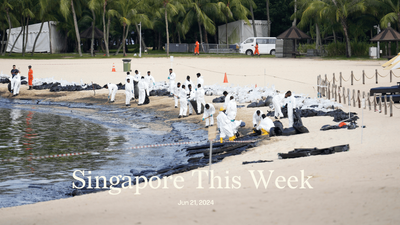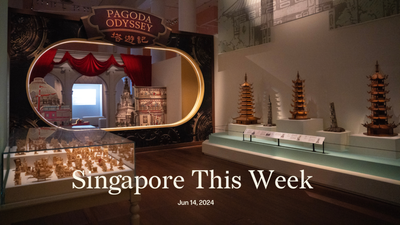Politics: Tharmania
Some heralded Singapore’s supposed post-racial future; others wondered how the ruling People’s Action Party (PAP) might benefit from the thumping victory by Tharman Shanmugaratnam, its former senior minister, in last week’s presidential election. Tharman, now president-elect, said: “I believe the vote for me and what I stood for is a vote of confidence in Singapore itself...” We don’t fully agree. In this highly problematic election, many, including opposition supporters, held their noses and voted for him, despite his association with the PAP, and despite his hand in influencing the political and socio-economic environment of Singapore today. It’s certainly not an endorsement of the establishment. The last time Singapore’s president was elected with a majority of votes was in 1993, when Ong Teng Cheong became the first-ever elected president (previous ones were appointed by Parliament). Tharman’s fans will be hoping that he demonstrates a similar independent streak. The opposition might also take comfort in Tharman’s mandate, given that traditionally risk-averse voters might now feel braver at the next general election (GE), due by 2025. The PAP has always been extremely prudent with its use of the reserves. Its fans like this, its critics don’t. Given that Tharman is a president with a strong mandate, so one theory goes, Singaporeans should feel greater comfort in voting for another party that offers a more expansive view of how the reserves can be used, not just for future generations, but the current one too. There are independent voters and maybe even some PAP fans who, recognising the deep socio-economic tensions in society, may be swayed—in the knowledge that Tharman, as president, will be able to easily check any profligacy. Most analysts believe an opposition victory is a few terms away, at the earliest. But even if that strand of thought—about the reserves and Tharman—exists for voters at the next GE, then in some small way, the much maligned office of the elected president will, finally, function as designed.
Society: Jom loses POFMA appeal
On Wednesday, Justice Valerie Thean, high court judge, rejected Jom’s appeals to the POFMA orders we received on July 16th. The orders asserted that Jom had made three false statements in our journalism on the Ridout Road bungalow leases and Instagram’s geo-blocking of Charles Yeo. (Original article here.) The first was that on conflicts of interest and breach of the Ministerial Code of Conduct, Teo Chee Hean, senior minister, only replied that it is more important to observe the spirit rather than just the letter of the Code. The second alleged false statement was that the Singapore Land Authority had spent “more than $1 million on the renovation for 26 Ridout Road and 31 Ridout Road because the Ministers were to be the tenants.” The third was that “the Government caused Instagram to geo-block a post by Charles Yeo.” Justice Thean, in her judgement, agreed with the POFMA office that Jom made those three false statements. On the third, as an example, this was part of her reasoning: “In my view, what the article does, by a series of speculative associations, is set out a case that the government caused Instagram to geo-block Charles Yeo’s post…while this is not spelt out literally, the whole import of the article leads to an [aforementioned] assertion...” We respectfully have a different take. Journalists, in light of limited information, have to posit certain lines of queries to discuss the issue. Jom’s position throughout has been consistent: we agree that the three statements are false but that we neither intended to make them nor indeed did make them. Justice Thean relied on a five-step framework established in a landmark POFMA judgement by the Court of Appeal in 2021. Part of that requires the judge to assess if “at least an appreciable segment of the potential readership or audience” would interpret the statements the way the POFMA office would. Justice Thean finds that an appreciable segment of Jom’s readers would. We respectfully disagree. At a larger level, it’s unfortunate that abstract interpretations need to be made because of a (poor) law passed presumably to combat actual online falsehoods. After first being rejected by the ministers who issue the orders, we are now contemplating a third and final appeal to the Court of Appeal. Stay tuned.
Society: Your scammer might be a victim
Singaporeans holding graduate and postgraduate degrees are among the hundreds of thousands of victims trafficked abroad to work in scam centres and illegal gambling houses, according to a new report by the Office of the United Nations High Commissioner for Human Rights (OHCHR). OHCHR’s findings, based on information from UN agencies, civil society organisations and governments, indicate that “well-educated, computer-literate and multilingual” Singaporeans are among those trafficked across borders by syndicates running large-scale scam operations around South-east Asia. In the past, such trafficking cases involved mostly victims with lower educational qualifications. But after pandemic restrictions eased, traffickers exploited the vulnerability of those desperate for work by baiting them with the promise of stable jobs in countries like Thailand and Myanmar. Victims were then smuggled across national lines to Laos and Cambodia, and had their passports confiscated while being forced to scam others online. Because of their relatively high qualifications, these victims were able to run more efficient and convincing scams, generating more revenue for these illegal operations—up to billions a year, according to the UN. Online scams, like love or cryptocurrency scams, have thrived since the pandemic when people started spending more time on the internet—in 2022 alone, Singaporean victims lost a total of S$660.7m. Other victims of trafficking were coerced into running illegal gambling houses. Illegal gambling operations have also been on the rise since 2014, with many casinos moving to less regulated spaces (including online spaces) when they were forced to close during the pandemic. Many victims were also tortured physically and sexually, with some sold and moved between different scam centres. “In continuing to call for justice for those who have been defrauded through online criminality, we must not forget that this complex phenomenon has two sets of victims,” said Volker Turk, UN High Commissioner for Human Rights. Because these victims perpetrated crimes under coercion and the threat of violence, OHCHR recommends a non-punishment principle.
Earth: Seas are rising, so are we
SG Climate Rally 2023 takes place at Hong Lim Park on September 23rd. “The impacts of climate change in the forms of heatwaves, floods, and rising sea levels are already being felt in Singapore and in the region,” explains SG Climate Rally, the ground-up movement behind the rally. “We gather because we believe that Singapore must take stronger and swifter action to reduce greenhouse gas emissions and offer robust support to communities most vulnerable to the impacts of climate change.” SG Climate Rally has been at the forefront of the climate justice movement in Singapore since its inaugural rally in 2019, where over 2,000 participants gathered in Hong Lim Park to call for stronger climate action. Since then, SG Climate Rally has led campaigns around climate policy, workers’ rights, and regional solidarity, to establish that climate change is a social issue that affects vulnerable demographics disproportionately, even though they have likely contributed the least to it. SG Climate Rally’s allies include environmental and community movements such as LepakInSG, Orang Laut SG and Workers Make Possible, who will be present at community booths this year. Speeches at the rally will draw linkages between the ongoing climate crisis and top-of-mind “bread and butter issues” like cost of living, healthcare and jobs. Representatives from SG Climate Rally were present at Tharman’s closed-door Access Singapore dialogue, held two weeks before the elections, where he affirmed: “Don’t stop being an activist...when it comes to the plight of dispossessed people in the region around us.” Organisers have since extended a formal invitation to Tharman. Will he respond? Attendance at the Rally may serve as a strong, first indicator of Tharman’s sincerity in involving civil society in his presidency. See the full programme here. You can support the movement by donating and/or showing up at Hong Lim Park in red.
Earth: Growing more with less to build food supply resilience
Achieving food security is key to Singapore’s long-term survival, and the Singapore Food Agency (SFA) has announced several initiatives that could help raise the island-nation’s food production. They include: a stacked farm concept to optimise land use; a cooling facility for farms that would reduce energy consumption; and a centralised waste treatment facility to process farm waste and reduce negative environmental impact. With the island’s mean sea level projected to rise by up to 1m by 2100, another idea is to create farming space underground. These concepts are part of the Lim Chu Kang masterplan, which lays out the vision for the area in northern Singapore considered the country’s high-tech “agri-food production hub of the future”. Currently, only less than one percent of land here is allocated to agriculture use. In order to achieve the city-state’s “30 by 30” goal of producing 30 percent of its nutritional needs by 2030, it’s crucial that SFA considers additional ways to intensify the productivity of this limited space. Global events, like the ongoing war in Ukraine and the growing threat of climate change, have again highlighted the urgency of reducing Singapore’s reliance on food imports. To enhance food supply resilience, Singapore has three strategies: enhancing local food production; diversifying important sources; and stockpiling essential produce, such as rice, frozen chicken and canned vegetables. SFA has been working with stakeholders, like government agencies and the industry, to find ways to enable and to encourage farms to grow more with less. The national push for high-tech farming has meant the loss of traditional methods of farming and harvesting, which are considered inefficient and laborious. Some 70 land-based farms were forced to shut down or find new premises after their leases in Lim Chu Kang weren’t renewed and the land returned to the government for military use. Last year, in the lead up to the mass exodus, several small-farm owners’ had appealed to have their leases extended, but were rejected by authorities. Evelyn Eng, who spent more than S$700,000 of her retirement savings to build Green Circle Eco-Farm, was one of the farmers whose appeals failed and had to abandon the land she had nurtured and tended since 1999; having managed to restore the soil and wildlife ecosystem of the leased land using natural farming methods.
History weekly by Faris Joraimi
I know the presidential election is over, but if I may say one last thing of interest about it from a historian’s perspective: Sybil Lau has quite the family background. In an interview she gave to Lianhe Zaobao (in English, peppered with delightful Cantonese), the fiancée of ex-presidential candidate Ng Kok Song held up a framed photograph from the Cairo Conference of 1943. In it, standing behind Chinese leader Chiang Kai-shek is Lau’s grandfather, Lieutenant-General Lin Wei. As fighting raged on in world war two, leaders of the Allied nations (the US, UK, and Soviet Union) met 14 times in different places to discuss their strategy against the Axis powers (Japan, Germany and Italy), and the world’s future. To signal their support for the Republic of China in the latter’s resistance against Japan, Franklin Roosevelt, US president, and Winston Churchill, British prime minister, met “Generalissimo” Chiang Kai-Shek in Cairo, enroute to Tehran for another big meeting with Soviet leader Joseph Stalin. At the time, Lau’s grandfather was one of Chiang’s top personal assistants, or in formal military terms, “Chief of the Office of Aide-de-Camp to the Generalissimo”. Just the year before, in 1942, Lin Wei was a key participant in the First Burma Campaign, as head liaison officer of the Chinese Republican (Kuomintang) forces. This campaign aimed to stop the Japanese invasion of Burma, then a vital link in the Allied supply route from India into China via Rangoon (present-day Yangon). Unfortunately the campaign was beset with problems, including the Chinese soldiers’ unfamiliarity with jungle warfare and their poor relations with the British forces helping them. After about six months, the Chinese defence collapsed. With its retreat, the Japanese advanced into northern Burma. After China’s communist victory in 1949, and the Republican government’s withdrawal to Taiwan, Lin Wei continued to serve at the highest levels of state power, as a strategic advisor to Chiang Kai-shek, by then president of Taiwan’s office. He died in 1953. Who would have expected one of his descendants to also, almost, be associated with another kind of presidential office.
Arts: Baybeats 2023
Baybeats, Esplanade’s flagship free music festival, is back this month with a line-up that celebrates the best of Singaporean music. Most significantly, iconic indie band The Great Spy Experiment (GSE) will make a return to the stage after an eight-year hiatus. They played their last show in 2015 at Esplanade’s Concert Hall, a triple bill with two other artists who very much shaped today’s music scene: Inch Chua (now stylised as iNCH) and Charlie Lim. The band’s members have remained involved in other musical projects: bassist Khairyl Hashim in synth group Riot !n Magenta, guitarist Tan Shung Sin (Song) in “grit pop” outfit Sherene’s Closet, and frontman Saiful Idris at SRNDR Records, an independent house label that he founded. Still, GSE’s return is welcome news for fans of the group that set out to “change the face of Singapore Music”. Also noteworthy is grindcore act Wormrot’s collaboration with Gabriel Dubko, European metal band Implore’s frontman, and multidisciplinary artist weish who also performs with sub:shaman and .gif. Wormrot recently kicked off their Burning Desire Asia-Pacific Tour with a sold-out show at *SCAPE The Ground Theatre. The first Singaporean band to perform at Glastonbury Festival, Wormrot has been a mainstay of the international grindcore scene since their formation in 2007. Foreign acts like Thai shoegaze quartet Death of Heather and Filipino alt-rock veterans Urbandub also feature on the Baybeats lineup. Admission to the festival is free but registration is required, through Esplanade’s website.
Arts: Singapore Book Awards 2023
The Singapore Book Publishers Association announced the winners of the 2023 Singapore Book Awards on Wednesday. The annual awards recognise achievements in publishing, not just literary value like the Golden Point Award or the Singapore Literature Prize. Independent comics publisher Difference Engine, a relative newcomer to the industry, picked up three awards, their first wins since they began publishing in 2018. Amazing Ash & Superhero Grandma #2: Coming of Age, a book where a young girl learns about her grandmother’s dementia, was named the year’s Best Young Persons Title. Work-Life Balance, a graphic novel that introduces South-east Asia’s mythical creatures to the drudgery of corporate life, took home both Best Literary Work and the top prize of the evening, Book of the Year. The full list of winners and nominees is on SBPA’s website.
Arts: Catch part of NAC’s five-year plan to boost local arts scene
The National Arts Council (NAC) launched their five-year plan, the elegantly named Our SG Arts Plan (2023-2027), this week. The roadmap was drawn up after conversations with “more than 16,500” relevant parties including artists, cultural administrators, members of the public, and both public and private sector partners. In line with this consultative approach, Singaporeans are invited to “Join the Making” to be a part of the art scene’s development. Several new initiatives were announced in conjunction with Our SG Arts Plan (2023-2027) like Catch, a “one-stop digital platform” (website) for news and event listings. It appears to be a relaunch of The A List, which was introduced in 2014 as NAC’s free fortnightly print magazine before becoming a “one-stop online arts and culture portal” (also a website). According to the media kit on its website, Catch also functions as a content creation agency for arts groups and lists packages that offer TikTok videos, website homepage banner features, “editorial write-ups” (articles), and “Catch Creators Activation” which presumably refers to user-generated content. These marketing packages will be available in exchange for perks like discount codes for Catch Members, media invites, and exclusive backstage access. NAC has also signed memorandums of understanding for the next three years with partners like SMRT, Mediacorp (who published The A List), and Marina Bay Sands. These partnerships are designed to create more visibility for local art and “monetise creative assets”. SMRT will facilitate the “I Play SG Music” campaign that broadcasts local music at MRT, LRT and bus interchanges; Mediacorp will help “cultivate new audiences” for the arts through advocacy, cross-sector interactions and content creation; and MBS will mine the apparently rich “intersection between the arts and the Meetings, Incentives, Conferences, and Exhibitions (MICE) sector”. NAC is also taking project ideas for Our SG Arts Plan (2023-2027). Send suggestions to NAC_Feedback@nac.gov.sg.
Tech: Biofourmis founder taking a break
Healthtech unicorn Biofourmis recently experienced a management upheaval following the abrupt resignation of Kuldeep Singh Rajput, its founder and CEO. This came shortly after a round of major layoffs at the company that affected about 120 employees. Ben Wanamaker from General Atlantic, one of Biofourmis’s most substantial investors, has taken over the new CEO office, established to guide the company’s operations. Founded in Singapore in 2015, the company specialises in pairing wearable technology with analytic software to individualise healthcare treatment. It moved its headquarters to the US in 2019 and eventually became one of South-east Asia’s leading healthtech stars with a valuation of US$1.3bn (S$1.7bn), after it raised US$300m (S$409.5m) in its Series D round in 2022. Rajput’s decision came as a surprise as it followed his reassurances to staff about the bright future of the company. Yet, it did occur just over a month after significant layoffs took place across their Singapore, India, and US operations. Undoubtedly, it has been a challenging climate for the healthcare technology market. But Biofourmis continues to demonstrate strong commercial traction, including a four-year collaboration with Georgia-based health system Augusta University Health and a multi-year agreement with Florida-based Orlando Health, announced earlier this year. While things seem tumultuous at Biofourmis, the refreshed leadership, continued commercial traction and leaner cost structure could improve the company’s ability to navigate a more challenging market.
Tech: Glints amidst a tech slowdown
Despite the global downturn in tech funding and layoffs, there are still glints of hope in tech hiring. Singapore-based career platform Glints achieved “record-high” revenues in FY2022, experiencing a significant 85 percent increase from the previous financial year, counter-intuitive for a bad year in tech hiring. This rise is attributed to a growing demand for cross-border talent. Oswald Yeo, CEO at Glints, suggested that businesses are adopting a “borderless mindset”, scouting talent beyond their headquarters. He cited cost savings and efficiency gains as critical priorities for businesses navigating the ongoing economic downturn. This shift has spurred growth at Glints. Increasing demand for cross-border hires has been seen in countries like China, Hong Kong, Japan, and Singapore. For instance, in Singapore, companies are forming regionally distributed teams, hiring developers from countries like Indonesia and Vietnam, as well as customer support and back-end teams from the Philippines. The Singapore and Indonesia governments have also supported the hiring of cross-border talent with the Nongsa Digital Park project, where over 150 multinational Singapore-based companies employ over 1,000 tech developers. Chinese and Hong Kong-based firms have also shown an interest in sourcing talent from South-east Asia and Taiwan, playing a significant role in helping Glints inch closer to profitability.
If you enjoy Jom’s work, do get a paid subscription today to support independent journalism in Singapore.







